I love my local public library.
They have the day’s newspapers and magazines, computer stations where you can browse or play games, an ample children’s book section, and a soft, padded play space with toys for younger kids.
However, it’s not just the books—although you can read just about any book you want, for free, which is still an amazing privilege that shouldn’t be ignored.
It’s also this sign on the door, an “Everyone Is Welcome Here” message in multiple languages with a rainbow pattern:
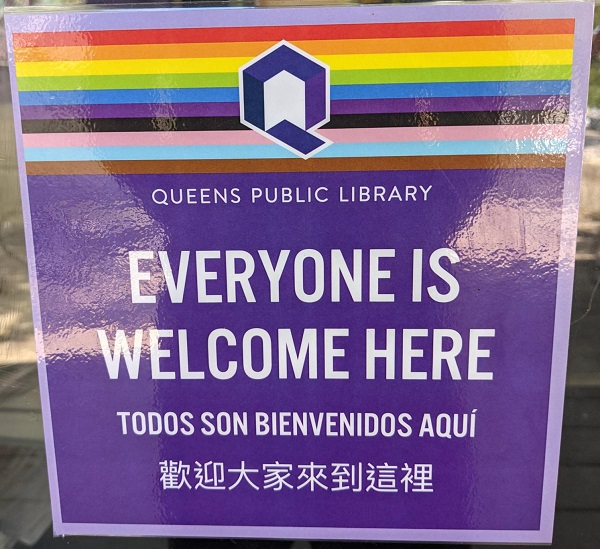
Next to it, there are reminders that the library welcomes all comers, regardless of gender expression or family status:
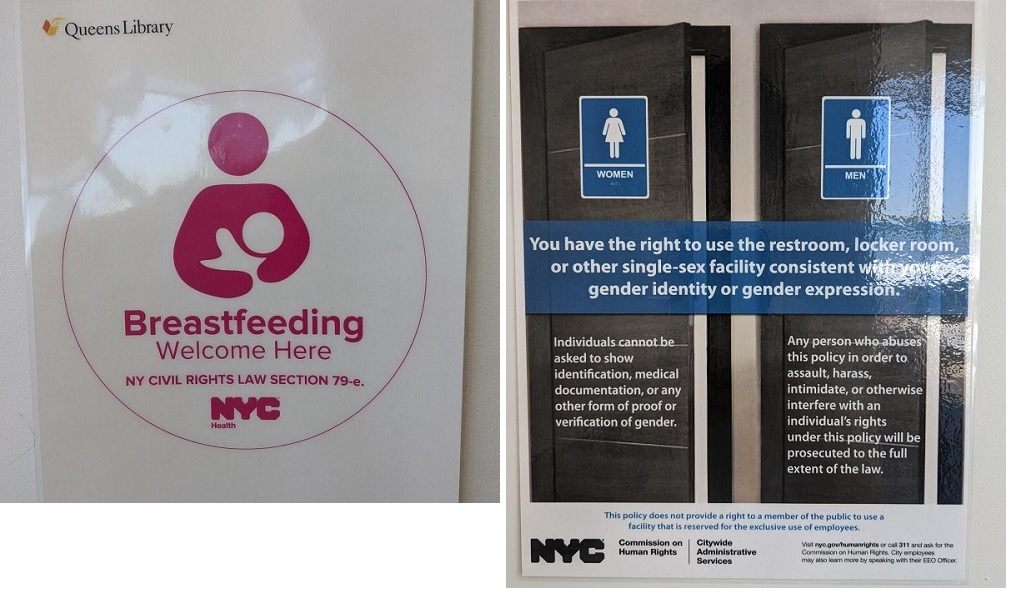
It’s the fact that they abolished late fees, so as not to scare away people who are too poor to pay them:
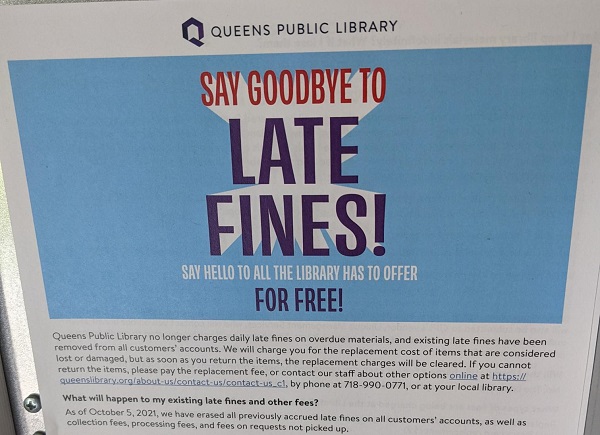
It’s this display near the door with brochures on immigration and citizenship:

It’s this display on the reference desk that explains how to find books on sensitive topics, like divorce or grief or drug abuse, without the embarrassment of having to ask a live person:
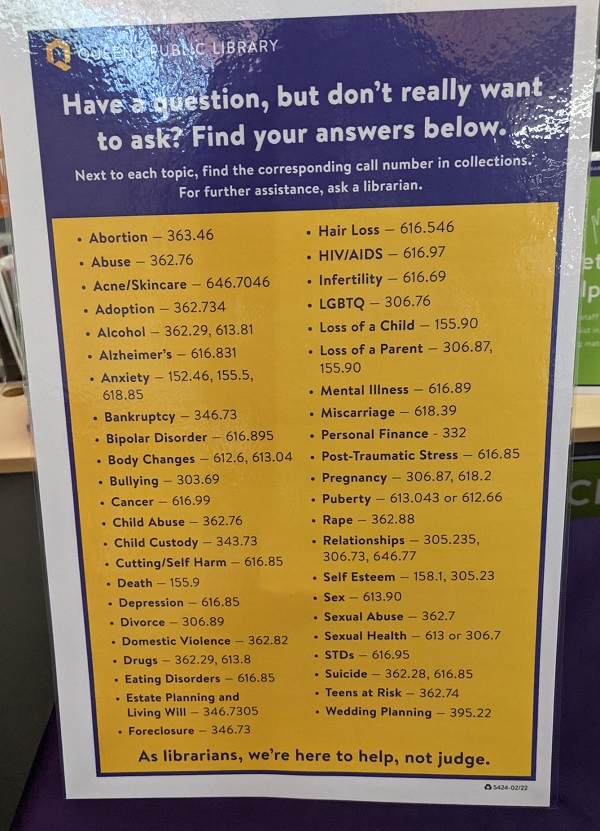
And, oh yeah, it’s this display devoted to banned and frequently-challenged books, encouraging patrons to check them out for themselves:

If this seems excessively political, it’s not. It’s the purest spirit of what libraries are supposed to do: namely, making knowledge available to everyone who comes seeking it.
Libraries do serve the familiar purposes, mine included. If you want to pass a rainy afternoon reading a favorite novel, or teach yourself how to code from a textbook, or peruse a cooking magazine for dinner ideas, or flip through a travel guide to plan a vacation itinerary, the library is there for you.
But libraries serve a higher purpose than that.
Books aren’t meant to be safe
Books aren’t docile, books aren’t tame. Books are dangerous. They’re meant to challenge us, to expand our horizons, to make us wrestle with ideas we hadn’t considered. They make us see the world through new eyes, shining the spotlight of empathy on people who used to be excluded. They send cracks of doubt spreading through the ice of too-comfortable certainties about how the world is supposed to work.
Churches, in a literal sense, are places of one book. They’re places where one story and one interpretation reigns supreme, where one voice decrees what will be orthodox. Libraries, in contrast, are wonderfully secular institutions. They offer a glorious multiplicity of perspectives, where no one will tell you what to believe or what to be interested in. They give you the freedom to choose for yourself.
Books aren’t docile, books aren’t tame. Books are dangerous.
Anyone who believes in freedom of speech—and that’s all of us, right?—ought to be cheering for libraries. If you want all ideas to be heard, and especially if you’re opposed to “political correctness” or “cancel culture” or whatever the boogeyman of the moment is called, you should want there to be a well-stocked library in every town.
Of course, that’s not what we see. As the religious right loses numbers and cultural power, they’ve become more vocally supportive of censorship and more ferociously opposed to libraries than ever.
Book burners are never the good guys
In August, in a small town in western Michigan, a group of conservative residents demanded that their library purge all books with LGBTQ themes. When the library board refused, they harassed two directors into resigning and then launched a campaign urging the town to vote down the library budget—which happened.
The library was facing closure, until supportive residents launched a GoFundMe campaign to make up the missing money. Donations poured in, including a $50,000 gift from the novelist Nora Roberts that put it over the finish line:
“Libraries are treasures, opening the door to books and stories for all. Librarians, to me, are the guardians of those stories,” Roberts said in a statement. “I find the idea of librarians—who offer community services beyond reading—facing threats and attacks, a community library facing defunding both appalling and sad.
“It’s an honor for me to stand up for the Patmos library and its staff.”
“Novelist Nora Roberts’ large donation part of $250K for library defunded in LGBTQ book controversy.” Michael Kransz, Michigan Live, 1 Sep 2022.
This was a win for the good guys and a loss for the wannabe inquisitors, but we shouldn’t rest on our laurels. Even if the library is safe for now, it’s discouraging that a majority of voters in the town supported its defunding. It speaks to a growing trend of narrow-mindedness and anti-intellectualism spreading among American conservatives.
The Patmos Library isn’t the only one facing threats and pressure. The American Library Association reports that 2021 was the worst year on record for attempted library censorship. Neo-Nazis and Proud Boys groups have also shown up to protest libraries in person and harass and intimidate their patrons.
It’s the purest spirit of what libraries are supposed to do: namely, making knowledge available to everyone who comes seeking it.
Red states are changing their laws to make books harder to get and easier to challenge. In Texas, censorious conservative parents have demanded the removal of books about race and sex from school libraries across the state. A Tennessee teacher recorded a viral video about how she has come in to work on weekends, unpaid, to catalog every single book in her classroom so they can be screened for “age appropriateness”.
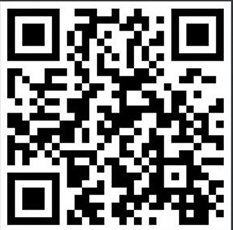
In Oklahoma, a high school teacher was fired for posting a QR code linking to the Brooklyn Library’s Books Unbanned project, which offers free e-book versions of frequently challenged books.
RELATED: Morality is a technology
The vast majority of challenged books either contain LGBTQ themes, were written by authors of color, or both. Some are challenged over sex scenes (although, unsurprisingly, books with same-gender relationships are judged far more harshly), but others don’t have sexual themes at all. Some are challenged merely because they concern America’s history of racism and colonialism, and bigots don’t want kids learning about that:
Another parent in Katy, a Houston suburb, asked the district to remove a children’s biography of Michelle Obama, arguing that it promotes “reverse racism” against white people, according to the records obtained by NBC News. A parent in the Dallas suburb of Prosper wanted the school district to ban a children’s picture book about the life of Black Olympian Wilma Rudolph, because it mentions racism that Rudolph faced growing up in Tennessee in the 1940s. In the affluent Eanes Independent School District in Austin, a parent proposed replacing four books about racism, including “How to Be an Antiracist,” by Ibram X. Kendi, with copies of the Bible.
“Banned: Books on race and sexuality are disappearing from Texas schools in record numbers.” Mike Hixenbaugh, NBC News, 2 February 2022.
In another case in Tennessee, parents were angry over a book about the civil rights heroine Ruby Bridges, apparently because they feared that teaching accurate history would make white people look bad:
Community members and local advocacy organizations have come forward in disapproval of books like “Ruby Bridges Goes to School,” “Separate is Never Equal,” and “George vs. George,” their argument being that teaching about the darker aspects of racism in United States history isn’t appropriate in elementary grades.
…Steenman said that the mention of a “large crowd of angry white people who didn’t want Black children in a white school” too harshly delineated between Black and white people, and that the book didn’t offer “redemption” at its end.
“Here’s what to know about the debate over ‘Wit & Wisdom’ curriculum in Williamson schools.” Anika Exum, The Tennesseean, 8 July 2021.
Is this infuriating? No doubt. But look at it from another perspective: the religious right is terrified of libraries and books.
They don’t think their narrow-minded worldview can survive a challenge. They’re convinced that their only hope is to prevent kids from learning about any other perspective. And they’re betting—in the age of the internet!—that they can shut out every idea that doesn’t agree with theirs. That’s a wager that no book-burner or press censor has ever won, and the odds against them are steeper than ever.